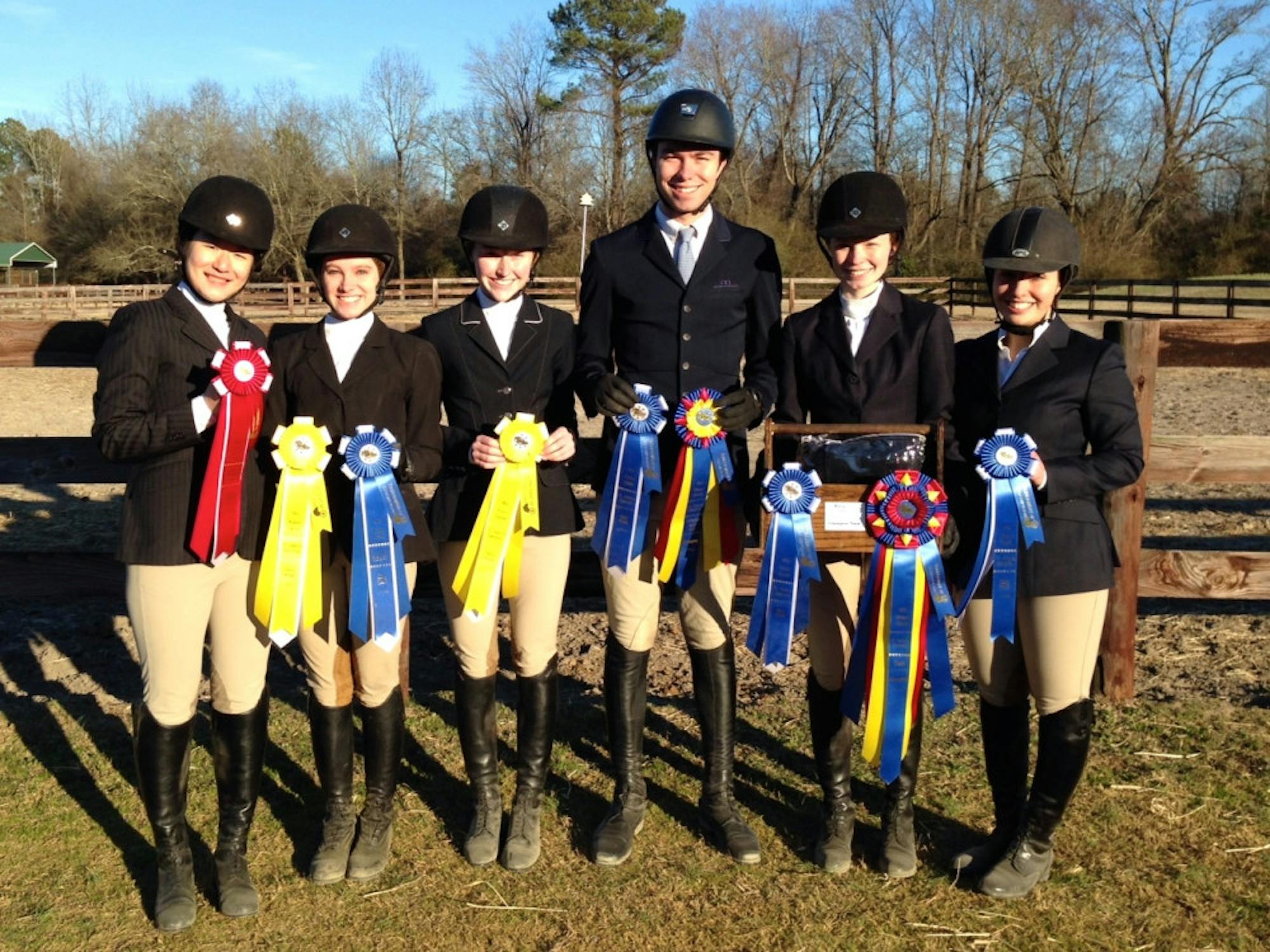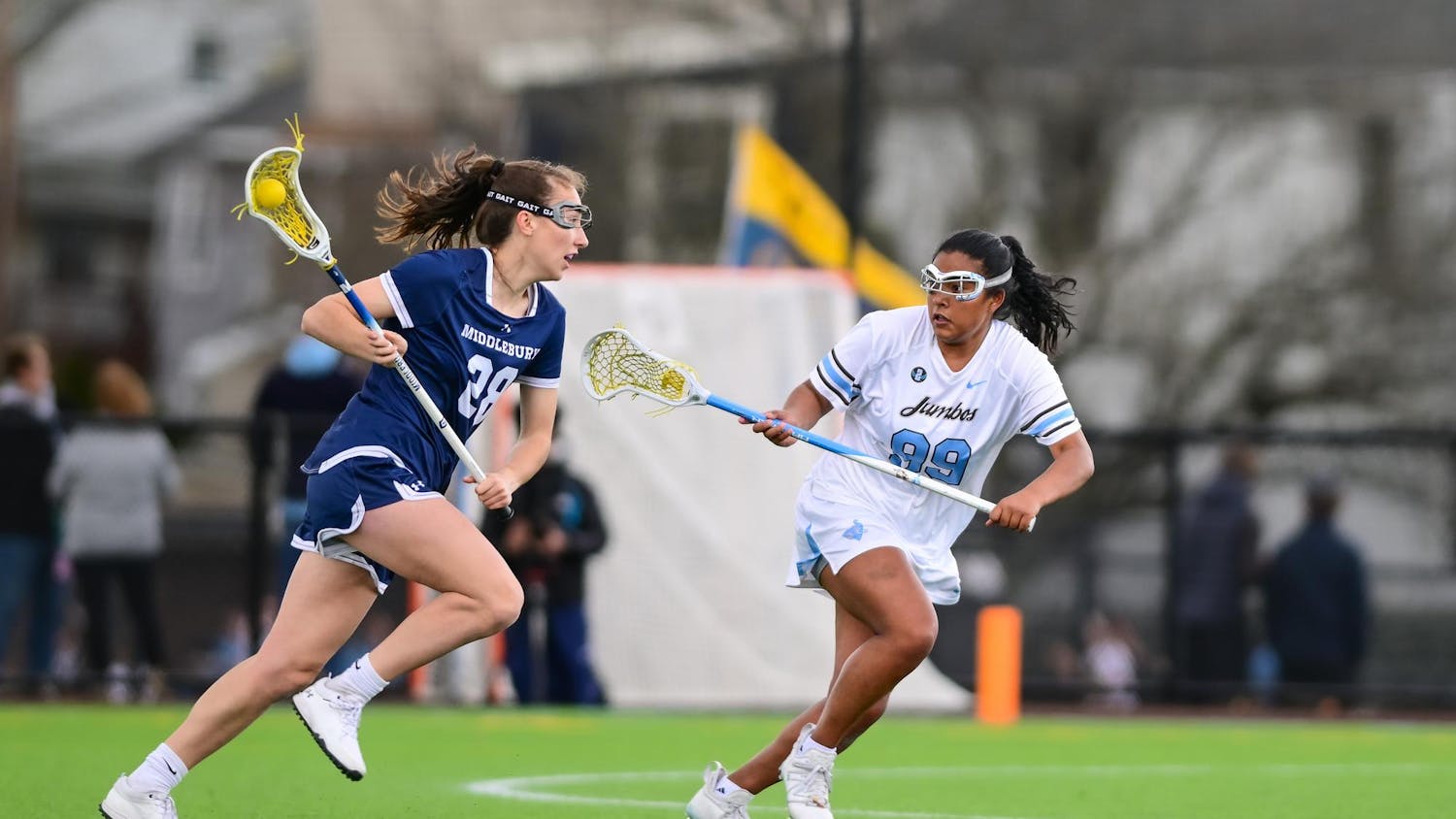The Tufts equestrian team, one of the school’s lesser-known club sports programs, has been dominating their competition once again this year. The team’s 35 equestrians have risen to first place in point total in their region so far this season and have four more events left this spring to help secure their fourth title in the last five years.
TUEQ, as it is known by its co-ed members, competes in the national Intercollegiate Horse Show Association’s Zone 1 Region 4 against 12 other Boston-area schools in a season that lasts from October to April, for a total of six events in the fall and four in the spring.
Tufts competes in hunt-seat equitation style shows where the riders are judged on their ability, style and body position as they navigate a course, with the goal always to look like one is riding gracefully and effortlessly.
“Our competitions are different from most riding competitions in that each rider does not bring their own horse to the show,” senior tri-captain Michelle Zackin explained in an email to the Daily. “The host school provides the horses, and there is a random draw at the beginning of the day to assign riders to horses.”
“The competitions are judged based on both a rider's position on the horse as well as how well they can adapt to and ‘figure out’ the horse they are sitting on,” Zackin continued. “Every horse is a little different, so being able to adapt to any kind of ride is an important skill to have.”
Each show consists of events in five different divisions: open, for the more advanced riders that have been competing for years at the highest levels; intermediate, the next level down; novice; walk, trot, canter; and walk/trot. Neither of the last two divisions requires any jumping, which allows newer riders to compete.
“That’s a great thing about the team, [that] there are riders from all levels,” junior tri-captain Chase Boggio said. “In my case, I’ve been competing for most of my life, but my score is weighted just as equally as someone who just started riding last year. And we do have many riders that just started riding when they got to Tufts and they’re able to enjoy competing.”
Each of the open, intermediate and novice divisions are subdivided into a fences class, where riders negotiate a series of jumps, and a flat class, where riders are tested on their ability to control their horse’s gait, which is essentially the same as the walk, trot and canter and walk/trot divisions except that the gaits tested become faster and more difficult at the higher levels.
“Flat classes are judged on position, promptness of transitions between the different gaits, and often how well you can use your space and stand out from others in the ring,” Zackin said. “Fences classes are when we jump. There is a specific course set, and each rider goes into the ring individually to jump the course of about eight jumps, one at a time. Fences classes are also based on position, but the goal is to be rhythmic and find the same ‘distance’ to every jump, [which] means the horse takes even steps all the way up to the base of the jump, jumps the jump and lands in the same rhythm.”
Before any riding begins, each team nominates a “point rider” in each class and division whose score will count towards the team total, though Tufts typically has anywhere from one to three riders in each class. A first-place finish earns seven points, second place earns five, third gets four and so on.
As Boggio explained, each division and class is weighted equally, so a first-place from a brand new rider in the walk/trot division earns the same seven points for the team as a first-place from an expert rider in the open division.
TUEQ may be well established at Tufts, but the program faces some of the toughest challenges of any club sport. The team has limited funding and, obviously, cannot train at Tufts. Though last semester the team trained at a farm in Sudbury, Mass., this semester it is moving to Volo Farm in Westford, Mass. According to Boggio, the hour-long drive to Westford typically limits the team to just one practice a week.
Despite these challenges, Tufts has had considerable success in its region in recent years, finishing first out of the 13 teams in 2011, 2013 and 2014. Just over halfway through their season now, the Jumbos once again sit in first place with 222 points accumulated over the first six shows.
They are followed closely by frequent rival Stonehill College, sitting nine points back, with other top teams from Boston University, Boston College and Wellesley College also on the hunt.
As their first place status would suggest, the Tufts riders have consistently finished each show near the top. In the fall, Tufts placed second in the Brandeis competition, third at Boston University, tied for second at their own show, tied for first at Mount Ida College, tied for second at Northeastern University and, in an exciting end to the fall, first at Boston College.
“The Boston College show was definitely a good one,” Boggio said. “We had a lot of new riders competing, so either freshmen who had just joined the team or others who just hadn’t competed as much, and they just kind of ran away with the title. Everyone was just really focused, and there was great team morale.”
In addition to its regular shows, TUEQ also sent a team of six riders down to North Carolina the weekend before last to compete in the exclusive, invite-only Tournament of Champions. Competing against some of the top teams in the country -- many of which are varsity teams with significantly more funding and training -- the Tufts riders won the tournament by a relatively large 11-point margin. Though the win gives them no points and does not help them win their region, it does bring national attention to a little-known program and certainly has been a boon to team morale.
The team hopes to use the excitement and momentum from that win as they dive into the second half of their season, which begins March 1 in a show hosted by Bentley University at Volo Farm.
If Tufts can fend off the other challengers and stay in first after Regionals in late March, they will move on to Zones in April. Boggio, Zackin, junior tri-captain Julia Rowe and the rest of the equestrians hope to finish in either of the top two spots in Zone 1, allowing them to move on to the IHSA’s national tournament in late April, which would be a significant accomplishment for a club sport program.
No matter how the rest of the season goes for Tufts, though, this group of horse enthusiasts will still enjoy the chance to ride in the competitions that TUEQ offers them.
“So in my case, I was a really serious competitor growing up and it’s a great way to get me competing, Boggio said. "For others who want to just kind of get in the saddle for the first time, it’s a great outlet for them as well. And above all, we’re a pretty tight-knit team and just a great group of people and it’s a great experience both in the competition arena and also outside [of it].”
Tufts equestrian rides to another year of success

Tufts riders, who range in experience level from novice to advanced, have taken their fair share of awards this year.





